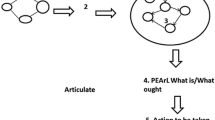Abstract
This paper deals with the different meanings given to the concept of virtual organisation. A typology developed by Campbell, consisting of four forms of virtual organisation, is presented. We illustrate this categorisation with practical examples. We will explain why we use the term virtual organising rather than virtual organisation. Our conclusion is that organisations planning to go virtual have to make technological and organisational decisions that are intertwined at a strategic level, resulting in a specific sociotechnical configuration of virtual organising.
Similar content being viewed by others
References
Beckers, D. (1997). CoopWWW. Interoperable Tools for Cooperation Support Using the World-Wide Web: Deliverable User Evaluation of CoopWWW-1.Telematics Engineering Project TE2003, Amsterdam.
Campbell, A. (1997). Knowledge Management in the Virtual Enterprise. In Jackson, P. and van der Wielen, J. (eds) Proceedings of the Second International Workshop on Telework: ‘Building actions on ideas. WORC,’ Tilburg University, 15–25.
Davidow, W.H. and Malone, M.S. (1992). The Virtual Corporation: Structuring and Revitalizing the Corporation for the 21st Century. HarperCollins, New York.
Dekkers, F. (1996). Interpolis, Je werkplek is waar je bent. Folder uitgebracht door Interpolis, Tilburg.
Faucheux, C. (1997). How Virtual Organizing is Transforming Management Science,Communications of the ACM.40(9). 50–55.
Hale, R. and Whitlam, P. (1997). Towards the Virtual Organization. McGraw-Hill, London.
Handy, C. (1995). Trust and the Virtual Organization, Harvard Business Review. May–June. 40–50.
Hirschheim, H.A. (1985). Office Automation: A Social and Organizational Perspective. Wiley, Ohichester.
McLoughlin, I. and Jackson, P. (1997). Organisational Learning and Virtual Technologies: Towards a Research Agenda. In Jackson, P. and van der Wielen, J. (eds) Proceedings of the Second International Workshop on Telework: ‘Building Actions on Ideas’. WORC, Tilburg University, 37–53.
Meynen, M. and Bots, W. (1996). Virtualiteit als realiteit. In Thema, bijlage bij 17 e BIG Congres, Virtualiteit als realiteit, ondernemen in een grenzeloze organisatie, March 1996. Bedrijfskunde Interfaculteit Groningen, 15–18.
Mowshowitz, A. (1992). Virtual Feudalism: A Vision of Political Organization in the Information Age,Information and the Public Sector.2(2). 1–19.
Mowshowitz, A. (1994). Virtual Organization: A Vision of Management in the Information Age,The Information Society.10(4). 267–288.
Mowshowitz, A. (1997a). On the Theory of Virtual Organization.Systems Research and Behavioral Science.14(6). 373–384.
Mowshowitz, A. (1997b). Virtual Organization,Communications of the ACM.40(9). 30–37.
O'Leary, D.E., Kuokka, D. and Plant, R. (1997). Artificial Intelligence and Virtual Organizations.Communications of the ACM.40(1). 52–59.
Straatman, T. (1996). De kantoornomaden, Intermediair.32(26). 13–17.
Upton, D.M. and McAfee, A. (1996). The Real Virtual Factory,Harvard Business Review. July–August. 123–133.
US Congress, Office of Technology Assessment (1994).Electronic Enterprises: Looking to the Future. OTA-TCT-600, US Government Printing Office, Washington, DC.
van Aken, J. Hop, L. and Post, G. (1997). De virtuele onderneming: begripsafbakening en evaluatie,Holland/Belgium Management Review. (53). 26–35.
van Dael, R. and Metselaar, C. (eds) (1997). De virtuele organisatie. Kluwer BedrijfsInformatie, Dordrecht.
van Eekeren, P., van Schijndel, P. and Veldhoen, E. (1996). Interpolis: Flexibiliteit in een ‘lean’ office,Management & Informatie,4(3). 42–49.
van Tongeren, P. (1997). Een bureau op rolletjes.Computable. 4 July. 25–27.
Vermeulen, M. (1996). Alle chefs de kamer uit,De Volkskrant. 10 August.
Author information
Authors and Affiliations
Corresponding author
Rights and permissions
About this article
Cite this article
Metselaar, C., van Dael, R. Organisations going virtual. AI & Soc 13, 200–209 (1999). https://doi.org/10.1007/BF01205268
Issue Date:
DOI: https://doi.org/10.1007/BF01205268




